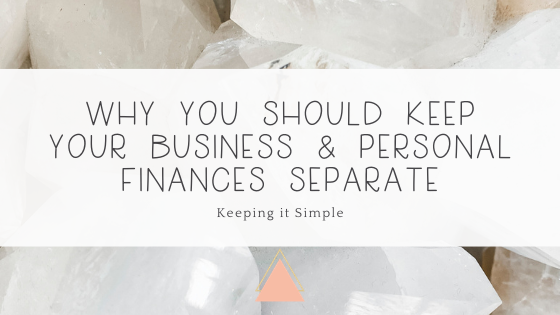Why You Should Keep Your Business and Personal Finances Separate
If you’ve ever lived with a few cats, you may have run into the situation where one kitty is eating more than her fair share. The offender is getting a little chubby.
Now you have a conundrum. One needs to eat less and the other needs to eat more. But, they eat together. And you don't have time to guard the food bowl every day.
Thus begins a game of moving food bowls, testing feeding times, and trying out healthy food brands. Neither cat is happy. You've got a few extra "love scratches" to prove it and they voice their complaints to you at midnight.
Trying to regulate how much food each cat eats is like, well, herding cats. Until you find a practical system to separate the animals and their meals.
When you start a business, you should tackle a few key to-do's to set yourself up for financial success. At the top of that list is to separate your business and personal finances. This business is separate from yourself. While it's challenging to keep them separated, you must when it comes to money.
But how do you actually do that?
For starters, you need separate bank accounts. You shouldn't use the same account for business and personal activity.
You wouldn’t feed your cats diet and regular food from the same bowl. Like so, you shouldn’t mix your business and personal funds. The results tend to be messy and you're never certain which cat ate what.
You can make your life (and your books!) way easier by separating your accounts. And it's not even much work, once you get it set up and establish good habits. Before jumping into how; let's go over why.
1. Separating your finances makes your books cleaner and reduces your tax prep time.
The average business owner spends 40 hours a year preparing their tax return. That's if they're preparing it themselves. It's not easy work. And it gets even harder if you muddy the waters.
Your books will be so much easier and less costly to prepare if you keep your finances separate.
I see this all too often with business owners, some even years into their business. They don't have a separate business account. When they run low on personal funds, they rely on their business cards.
Quite often, they don't keep up with their books weekly. By the end of the year, they have to untangle a huge rat's nest of transactions.
When they finally start the books, chances are they can't remember what happened 3 months ago. Let alone 9, 10, or even 12 months ago. This makes preparing books and taxes like listening to nails on a chalkboard.
It also means they lose the best benefits of having books - to gain insight into their biz and make savvy decisions.
As Nike says, just do it. Keep it clean, and keep up with the work. You'll improve your life, biz, taxes, and stress levels. Everything financial will get easier. In part because you can use software to do most of the work.
One of the best reasons to get a business bank account is for how well it works with accounting software. You can link your bank account to the software and it will download all transactions. This makes bookkeeping so much easier because it cuts out data entry. Then all you have to do is categorize the transaction and attach a receipt.
Here are a few more caveats related to keeping separate bank accounts:
Credit Cards
Like your bank accounts, you need to keep your credit cards separate as well. If you want a business credit card, get one. Do not use a personal card. Then, once you have both accounts, be mindful of which card you use when checking out.
Shared Expenses
For many biz owners, one expense may cover both business and personal purposes. A common example of this is a cell phone bill. Many people use their personal cell phones and do not have a separate business phone or service. You'll need to estimate how much you use the phone for business. It happens sometimes, but try to limit these items.
Check-out Twice
Whenever you do need to go to the store for both business and personal reasons, check out twice. Separate the items. Pay for personal things with your personal card. Pay for the business items with your business card.
No excuses. It only takes a minute longer. Plus, most cashiers are fine with processing more than one transaction for a customer.
2. You can lower your legal risk by separating your business and personal accounts.
If you want to limit your liability, keep your finances separate. This applies to any business organized as an LLC, S-Corporation, or C-Corporation. You're risking the legal protections if you mix up money.
One of the most coveted benefits of an LLC or Corporation is legal liability protection. Sole proprietors and partnerships do not have this limited liability protection. If something goes wrong in the business, they could lose all their personal assets.
When you mix business and personal finances, you risk "breaking the corporate shield." In effect, it means you are not treating the business as separate from yourself. A judge could rule that you do not have limited liability based on how you operate the business.
Small businesses usually organize as an LLC to limit liability. That's the point. I wrote in this blog why it's important.
In a nutshell, you could lose everything you own if your company gets sued and loses. Not only your stuff, but if you have a spouse the plaintiff could go after their assets as well. This means your house, your car, your spouse's car, your savings, and future income are at risk. Unless you have limited liability.
If you expect to ever own anything of value or have kids or get married, it's wise to have legal liability.
To protect that limited liability, you have to treat the business as separate from you. One key factor courts look at is if you keep your business and personal finances separate.
3. Mixing personal and business money could make you overpay your taxes.
When you're mixing business and personal, it's harder to keep up your books. Falling behind is a big problem. If you wait until year-end, you're not going to remember any transaction details. You may think that you will remember but rarely is that true.
For example, do you remember what you wore three Thursdays ago? No cheating or looking through at photos! 😜
The IRS wants you to keep very clear records of your business expenses. Unlike normal employees, business owners can deduct expenses from their income. To justify the deductions, you need to keep good records. If you get audited the IRS will ask for the books and receipts. If you don't have them, you could end up owing more taxes, penalties, and interest.
If you don't have receipts, and you don't have notes, you don't have a record justifying taking a deduction. You'll lose to the IRS each time. You may have spent money on the business but since you didn't track it, it's harder to prove.
Even if you work with the tax prep professional, you still need to keep a set of books and receipts. We're going to ask for records. We're allowed to rely on your word unless we spot something odd.
Without clean books, it's likely you're overpaying your taxes. You need to err on the side of caution. You risk missing out on deductions when you can't remember what was business or personal.
You can limit this risk by keeping your finances separate and your receipts. Good habits give a tax preparer and the IRS more confidence in your case.
Bonus: What to look for when opening a business bank account.
Now that you know why you need to keep your finances separate, let's get into how. You need to create separate bank accounts using the business's name and EIN. Most banks offer business accounts. Here are my tips on what to look for.
There are two main types of financial institutions you can choose from. The first is a regular bank. These are for-profit businesses. The second is a credit union. These do not have a profit motive. Both have pluses and drawbacks.
Note: I have a habit of referring to both types as banks when not discussing their differences.
To get started, consider which features you need. Do you want to e-deposit checks? Do you need a physical branch to deposit cash? Do you want to pay bills online? Do you travel and need to have branches available in a wide area? Do you want to use an app to do most of your banking?
Some people want to use the bank closest to their home because it's convenient. Other people need a 100% remote bank because they can't make it to a branch ever.
These are all important considerations, but not the only ones.
The biggest concern is usually the fees. This is why a credit union is usually better. They lack a profit motive because they are member-owned, so they are less likely to charge extra. However, the lower fees come at a cost. They usually don't provide as many services as a bigger organization.
The big banks need to impress Wall Street and investors. Thus they charge more fees. Unless you can keep a high minimum balance.
If your best option charges lots of fees, consider the cost of your time. For instance, how long will it take you to accommodate another bank? If it's further away or lacks certain features, it'll take more time to do your banking.
Also, if you don't prep your own books and taxes, it could end up being more expensive. Paying an accountant to separate your business P&L may cost more than you would have paid in account fees.
Make a checklist of needed and desired features to use when evaluating your options. As you research your options, fill out the checklist. Whichever institution you pick should have at least all "needed" boxes checked.
When clients ask me which institution is best, I respond with questions. Since it's a more nuanced conversation, I get into their business plans. Building a relationship with a bank is important. Especially if you want to get a business loan at some point. Some banks feel more open to lending if you have your business and personal accounts with them. Then we'll discuss what services they need.
Generally, I recommend bigger organizations due to their many branches and services. But, not always. A regional credit union or bank may have all the services you need. It depends on what you need.
You'll likely find many banks that fit your needs, so the rest comes down to your preferences.
Take it all into consideration. There's no one right answer for everybody. And if you'd like to discuss what's your options with a professional, I'm always here for you.
Many new entrepreneurs don't know what they need to be doing. You may have made some of the above mistakes too. That's fine, it's in the past. But, let's correct it going forward.
Keeping your finances separate may be difficult at first. But, it will become a habit and second nature in time. Do yourself a favor and separate them. You'll rest easier knowing that you doing things the proper way. Plus, your bookkeeping will be easier and you're less likely to overpay on taxes.
Keeping business and personal separate is tough, but not as tough as putting one cat on a diet. I have faith in you. (And faith in myself that I'll find a way to put Cami on a diet).






